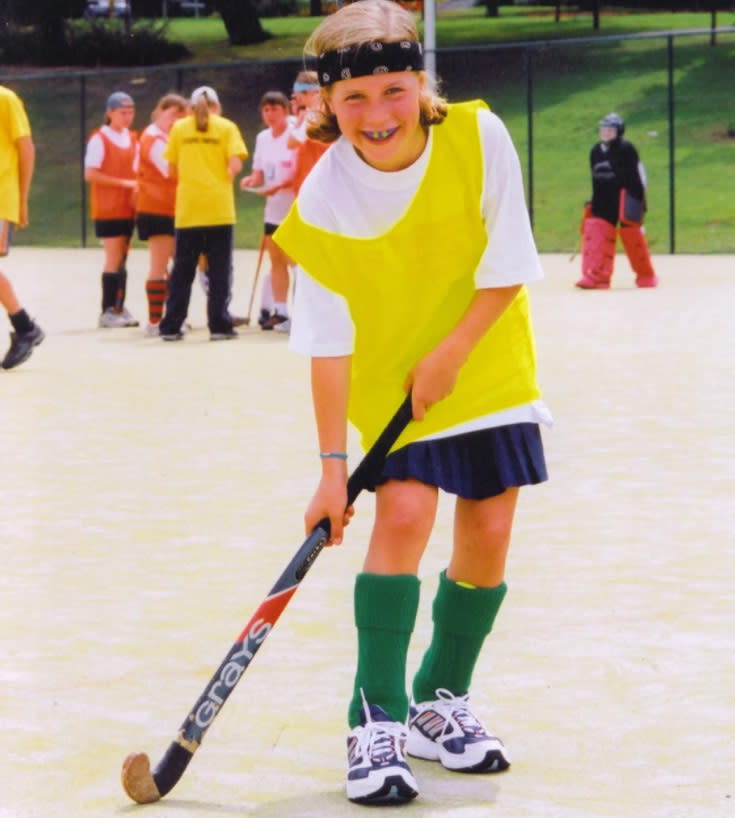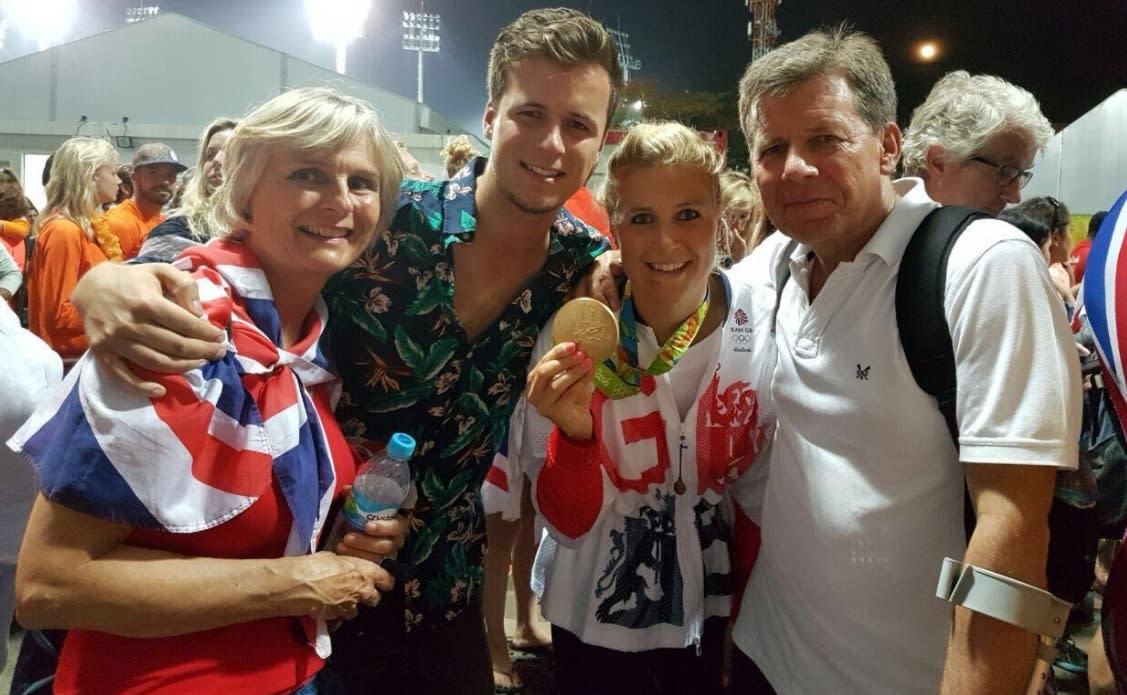The parents behind the athlete: British Olympic star’s journey from ‘rock bottom’ to gold medal glory
Robert Twigg, father of Great Britain’s gold medal-winning Georgie, occasionally looks back at the glowing hockey match report where his daughter scored two goals on senior debut as a spritely 12-year-old.
It was Georgie’s first coach, Tony Perrin, who wrote the report and was also adamant she could become an international player after making her debut for Lincoln Hockey Club women 2s. Yet, by their own admission, Georgie’s grounded parents were later preparing Georgie for dejection. “But it never happened like that. She just kept on going,” says Robert.
Her meteoric career prospered after debuting in 2010 for the England and Great Britain teams. An Olympic bronze at London 2012 was gleaned before her career was bookended on the most marvellous of nights for British hockey when the BBC 10 O’Clock News was moved as millions tuned in to watch Team GB women’s dramatic shootout gold in Rio.

“We were great believers that she played all sports,” Robert recalls. “But she was lucky to go to a school [Repton] which focused on hockey and that’s why her career developed as it did.”
Georgie found her natural position in midfield at under-18 level and was part of an England team which secured a first ever podium finish - bronze - at the 2010 World Cup and the experiences of playing in Argentina. One where “the stadiums were shaking, 10,000 were jumping up and down” and Maradona flew in to watch their game in Rosario.
By now training full-time at Bisham Abbey, she was also studying law at Bristol University and still not sure whether to pursue her hockey. She didn’t think that London 2012 was on the agenda. Coupled with this, Robert admits that Georgie was worried about selection “every single time”.
And despite her brilliant stick skills, even Georgie harboured doubts. “I didn’t think that ever becoming an Olympian was a target, even when going to university I didn’t see it as a realistic goal," she reveals. "I knew I was at a certain level but I had doubts whether I could go all the way.
Two years later she ran out at London 2012 as the youngest player in the Team GB squad. “A huge stadium with GB fans, my heart was pounding,” is Georgie’s recollection. “I did my first stint on the pitch and I came off, sat down and adrenaline was pumping through my veins.”
Her family were of course there, as well as Georgie’s late grandfather, who cried when his granddaughter was profiled on the big screen before the game against Korea. She also scored that day as Team GB ultimately ended up with a bronze medal and the fearsome Dutch won gold.
The next major tournament ushered in the moment which paved the way towards success. It came via a disastrous 11th place finish at the World Cup in the Hague - as the Netherlands once again stole the show.

“We hit rock bottom,” admits Georgie. “For days afterwards we sat in a room and had frank and brutal conversations as a squad and what we wanted to achieve. The summer of 2014 was a pretty awful time in all our hockey careers. But it was the best thing for us.
“I always say that those two years were my hardest. I was invested in hockey. But when you go through things like a World Cup or an injury I would lean on my family. I’m 100 per cent a home bird and I would go back at every opportunity.”
By hook or by crook, the England squad turned round their fortunes and in front of a home crowd for EuroHockey 2015 in London, unerring belief saw them come from two goals down to beat the Dutch in a shootout.
One summer on and the Twiggs were in Rio. As parents, their expectations were for Team GB getting to the last eight before touring Rio in the second week. “But they got better and better, the momentum built up and it was the best experience we’ve had at a sporting event,” says Robert.
The semi-final against New Zealand was brutal. It is a blur in Georgie’s mind. First Crista Cullen went off with a head injury before Georgie took a ball to the mouth. Moments later both players were laid out on the bed receiving treatment; Cullen getting stitched up and urging the doctor on. A Team GB liaison officer found Robert and wife Cathy in the stands and gave the thumbs up as both finished the match.
Come the gold medal match and, when GB scored late on to equalise at 3-3, Robert sensed the wind had evaporated from the Dutch sails. Their coach had her head in her hands and GB knew they had the psychological advantage ahead of another grandstand shootout finale.
When the winning shootout goal was scored, Robert was slumped in his seat with exhaustion. Families then met up beneath the stands before a raucous rooftop party. “It was so special as there was a great group of family and friends who had all been part of the journey,” recalls Georgie.
Georgie’s brother, Charlie, was also in Rio that night. A talented sportsman himself, Robert was always aware of not shifting all parental attention on Georgie as her career blossomed.
“It is difficult as a parent where one child is excelling and another who loves his sport wasn’t doing quite as well,” admits Robert. “It is a balancing act. But I got as much fun watching Charlie play school sport on the touchlines as I did with Georgie. You just have to make sure you don’t neglect that child.”

Georgie, who still phones home most days, quit international hockey after Rio, aged 26, and is still one of English club hockey’s standout players with London team Surbiton, domestic women’s champions for the last seven seasons. Moreover, the retirement fear factor facing many elite athletes was never a problem for Georgie. That is largely down to her parents.
“We were lucky that she was academic,” says Robert. “Hockey is not a sport which will provide a great living and it was reassuring that she was pursuing her legal career [she is now at top law firm Bird & Bird].”
“You always encouraged me to be balanced in my life and to do all my studies,” Georgie tells her father. “I never knew if my career could be cut short by non-selection or injury and retiring. I was lucky as the transition out of sport was smooth and I am lucky my parents were so supportive in that.”
Just as supportive as they were watching Georgie become a golden Olympian. “I’ve never held a stick in my life,” Robert says proudly. “You’d think he did though with the amount of advice he’s given me,” jokes Georgie.
This interview is part of an exclusive Yahoo series, in which we speak to Olympic stars around the world and their parents to get a unique insight into what it takes to raise an Olympian. For all the interviews, click here.


